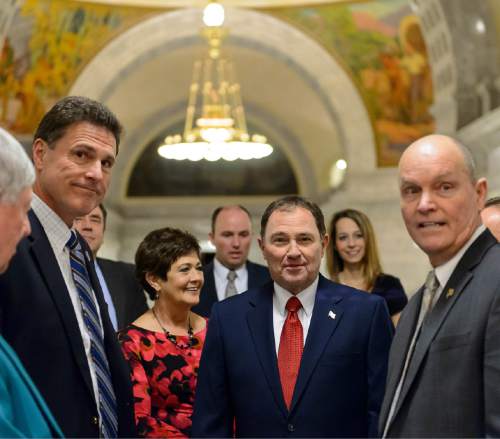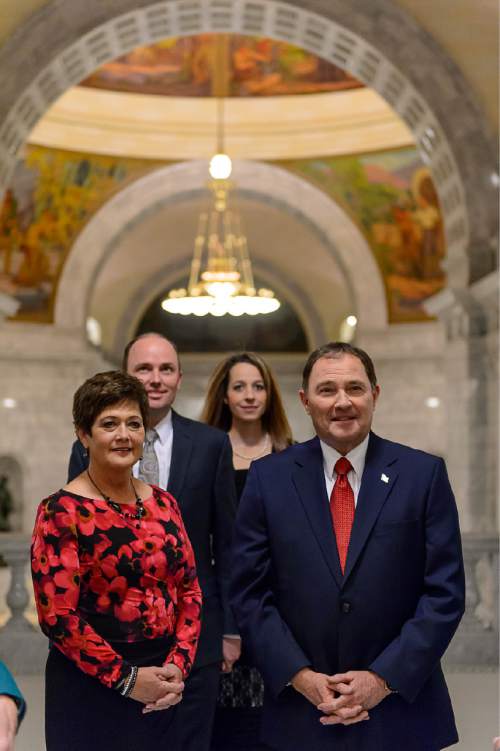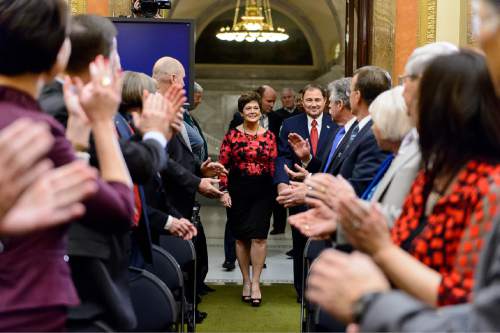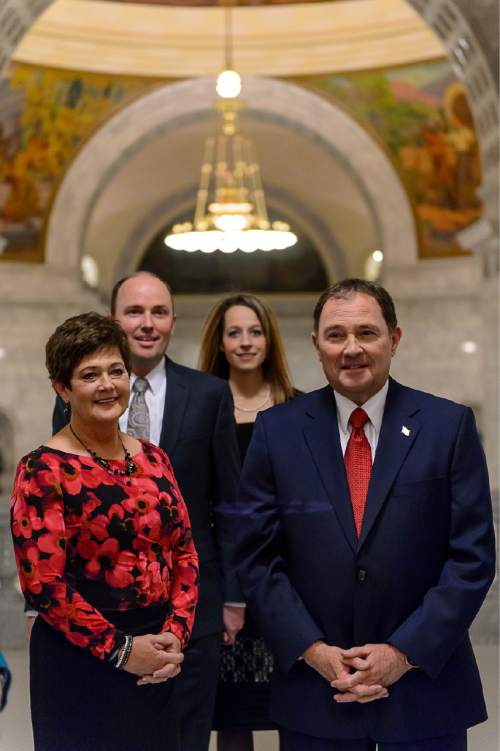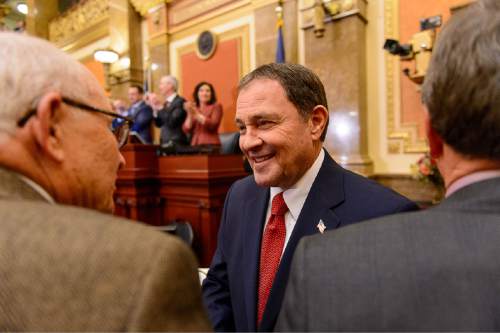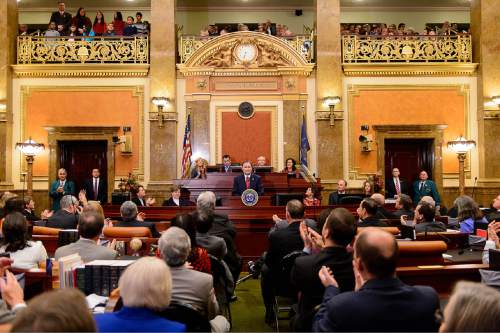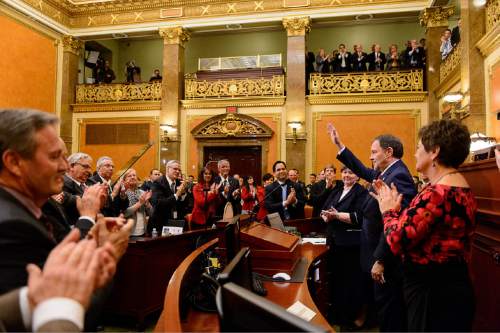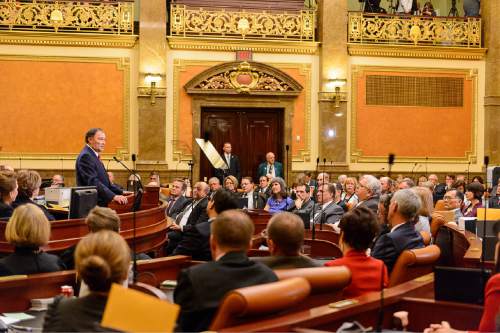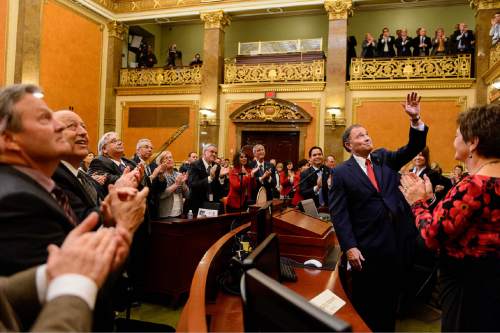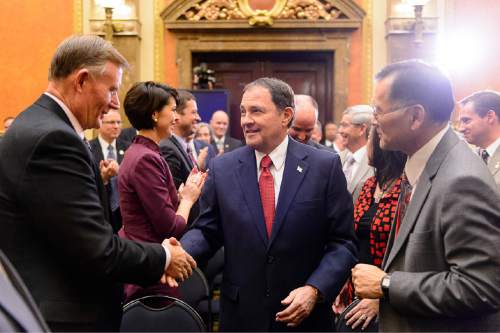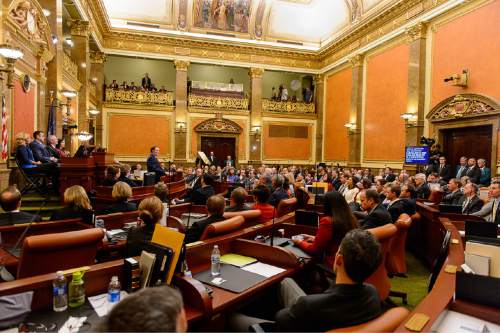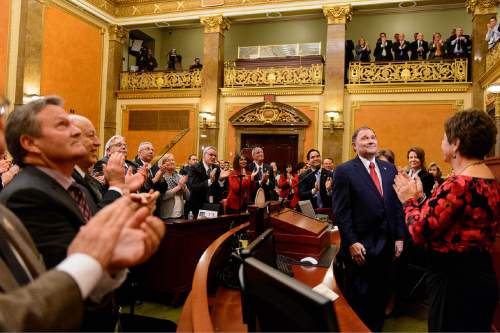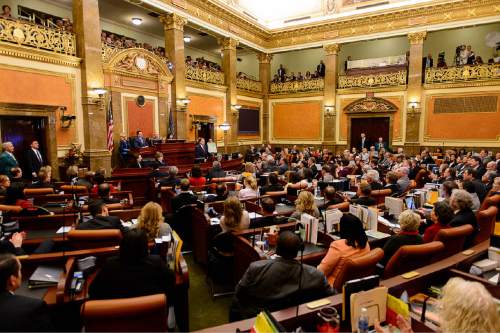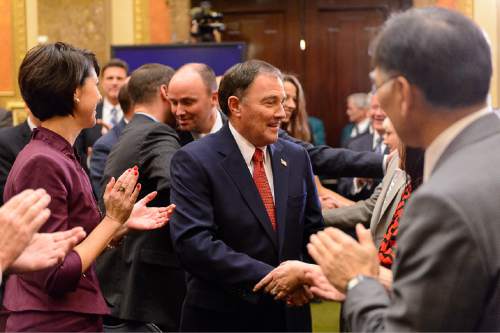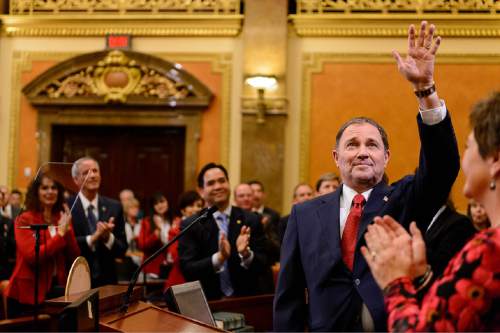This is an archived article that was published on sltrib.com in 2015, and information in the article may be outdated. It is provided only for personal research purposes and may not be reprinted.
After years of austere budgets, Gov. Gary Herbert said Wednesday that a revitalized economy and healthy surpluses make now the time to invest in the state's future, and called for a major infusion of money to education and discussions about how to pay for future transportation and water demands.
Herbert also used the platform of his State of the State address to echo a call issued Tuesday by top leaders of The Church of Jesus Christ of Latter-day Saints for the enactment of legislation protecting religious liberties.
Church leaders said they support passage of a statewide ban on housing and employment discrimination against gay and lesbian residents, but said protections for religious beliefs are essential to provide balance.
Herbert agreed.
"I firmly believe that, to protect the personally held values of people on all sides of this issue, any advancement of non-discrimination legislation should be coupled with legislation to safeguard protections to religious freedom," the governor said.
Numerous other states have considered religious-liberty legislation. It became law in Mississippi; the governor of Arizona vetoed the bill.
Herbert also took aim at a familiar target, asserting that Utah is better able than the federal government to find solutions for providing health care, educating children and managing public lands.
"We will never back away from the challenge that every state in America faces today — the constant overreach of the federal government," Herbert said. "If states fail to stand up and speak out for the right to self-determination, we will lose that right to an ever-expanding federal bureaucracy."
But, Herbert said, the state is at Washington's mercy when it comes to health care. With the passage of the Affordable Care Act, commonly known as Obamacare, Utahns will pay nearly $800 million in taxes each year.
He said his proposed Healthy Utah plan, which would use federal Medicaid money to subsidize insurance for about 100,000 of the state's poorest residents, is the best way to recoup some of that money, maintain some local control and help those in need find work.
"The choice before us is stark: We can either watch our hard-earned tax dollars remain on the table in Washington, D.C., primarily benefitting other states, or we can bring back a significant amount of our own money to Utah to be spent on Utahns," Herbert said.
Utah is one of seven states that have yet to make a decision on whether to expand Medicaid coverage to provide health care to those not currently covered making up to 138 percent of the poverty level, according to data from the Kaiser Family Foundation.
But Herbert's plan has little support in the Republican-dominated Legislature, with legislative leaders concerned about the long-term costs and sustainability of the plan. A legislative task force recommended a much more modest state-based plan that would cover up to 16,000 Utahns deemed medically frail or suffering from mental illness or addiction.
House Majority Leader Jim Dunnigan, R-Taylorsville, said he has had "frank discussions" with Lt. Gov. Spencer Cox and the governor's staff on the issue.
"The problem here is not the governor and the Legislature coming together. It's the federal government giving us such stringent requirements," Dunnigan said.
If the Obama administration would cover the costs to insure just those below poverty — with those up to 138 percent of poverty qualifying for federal subsidies — they would agree, Dunnigan said. But the administration won't do that.
Senate President Wayne Niederhauser said only covering the medically frail leaves a large group without coverage, but the state would actually have to pay more to cover those up to the poverty level than it would up to 138 percent of poverty.
"We hate the idea of expanding to 138 percent, but maybe there are some benefits to that plan," Niederhauser said.
Democrats say it's foolhardy to pass up the opportunity to help 100,000 Utahns get health insurance and reject the hundreds of millions of federal dollars.
"It's fiscally irresponsible for us not to expand Medicaid, at least to the level the governor has talked about," said House Minority Leader Brian King, D-Salt Lake City. "It's a joke to reject Healthy Utah … and still claim you're the best-managed state in the country."
On education, Herbert has recommended an increase of nearly $500 million for public and higher education, including the largest increase in per-pupil spending in public schools in 25 years.
On Wednesday, he also expressed support for expanded instruction on the U.S. Constitution and the free-market economy and asserting state and local control over how students will be taught. He promised a report next week, in conjunction with Attorney General Sean Reyes, "reaffirming" that the state, not the federal government, controls "every aspect of our education system."
"Rest assured, we will assert our rights to exercise local control over what we teach and how we teach it," he said.
Legislators are being more cautious about pumping money into education.
Niederhauser said the Legislature wants to get as much money as possible to education, but lawmakers also want to sock enough away that they aren't forced to take money away from schools if the economy starts to falter.
Senate Minority Leader Gene Davis, D-Salt Lake City, said adequately funding education is common sense, but "how are we going to get there with no money?" Just relying on economic growth will only maintain the status quo, which is inadequate, he said. The state needs to look at closing tax loopholes and incentives to find more money to put into schools.
Herbert's anti-Washington theme extended to public lands, where the governor said the state must "stand up to federal overreach."
"Utah is, and will always be, a public-lands state," he said. "The question is: Who will manage our public lands most effectively — the best-managed state in America or the federal government that is $18 trillion in debt? The answer is obvious."
The governor announced one new program — a statewide Office of Inspector General that would investigate complaints of government misconduct.
Reyes, the attorney general, said the concept has been used in other states. The idea would be to create an independent office with resources and expertise to look into alleged corruption at the state, county and city levels.
And Herbert said he would work alongside legislators to find solutions to important growth-related issues — finding ways to pay for the state's road-construction needs, reforming the prison system with the aim of curbing growth and "rebuilding lives," investing in water development to keep pace with a growing population, and cleaning the state's frequently unhealthy air.
Twitter: @RobertGehrke


